Donovan on claw-hammer, classic songs and Celtic influences
From playing with Page to teaching The Beatles
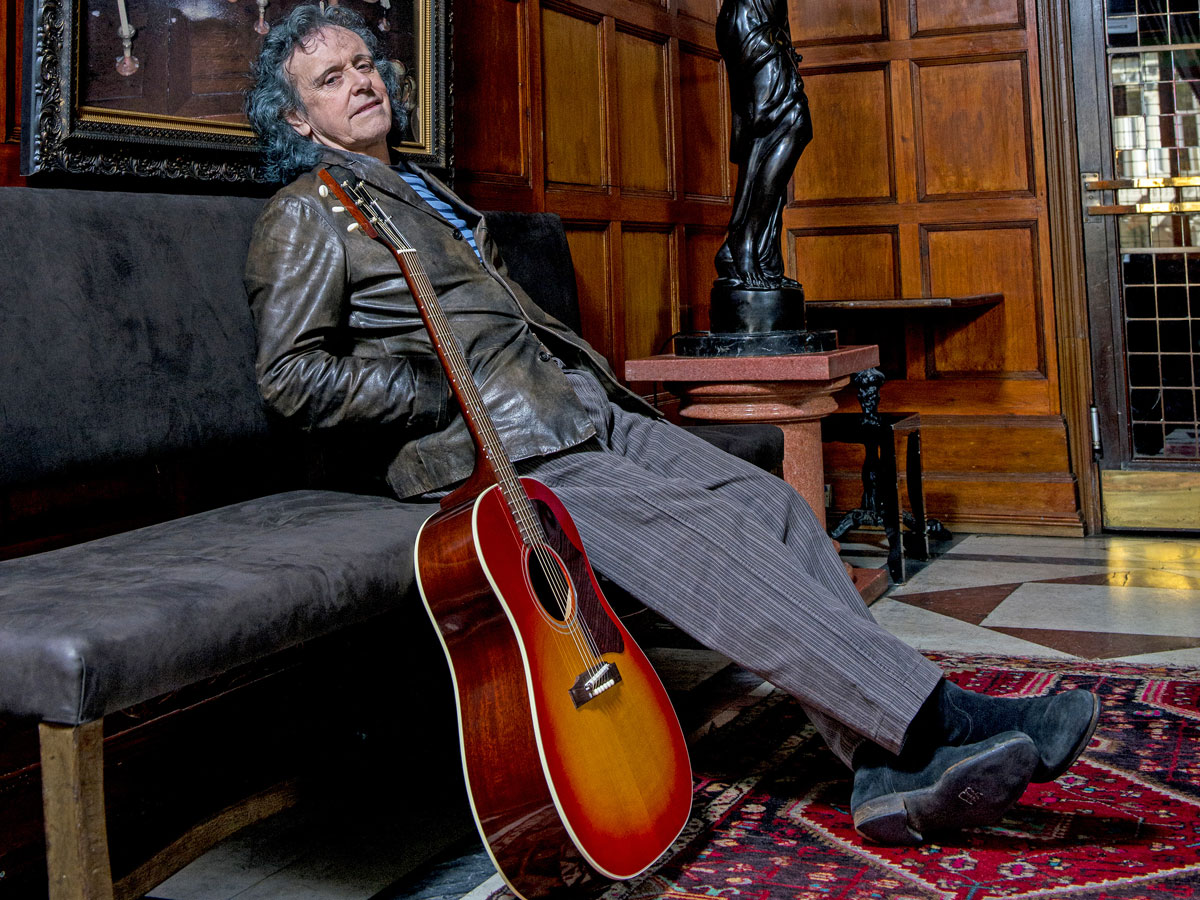
Introduction
Pioneering folk-fusioneer Donovan sits down to chat about penning classic songs, influencing The Beatles and sidling up in the studio with Jimmy Page...
When you start chatting to Donovan - arguably one of the greatest singer-songwriters this nation has ever produced - you instantly pick up on the passion, fervour and musical intelligence that have helped guide him through five decades of ever-evolving songs.
"From a guitar perspective, the man is definitely underrated"
His new compilation album, Donovan Retrospective, is a two-CD anthology covering the first five years of his career (1965 to 1969) where his effortless genre-hopping and thirst for sonic fusion and experimentation shout out loud and proud throughout.
Acoustic folk, blues, psychedelia, heavy-edged rock, Eastern-tinged balladeering, West Indian grooves, funk, soul, baroque pop, fuzzed-up garage - Donovan was dabbling in it all from almost the first moment he stepped into the 60s pop limelight.
From a guitar perspective, the man is definitely underrated. Just take a listen to his sublime fingerpicking on Summer Day Reflection Song or the Bert Jansch-esque Oh Deed I Do and you’ll start to at least get a feel for Donovan’s six-string prowess. This is, after all, the guy who taught The Beatles the clawhammer.
On top of all that, what do Jeff Beck, Jimmy Page, John Paul Jones, Rod Stewart, Danny Thompson, Big Jim Sullivan, Aynsley Dunbar, Jack Bruce and John Bonham all have in common? Yep, that’s right, they’ve all played (or sang) on a Donovan recording session. That’s some backing band.
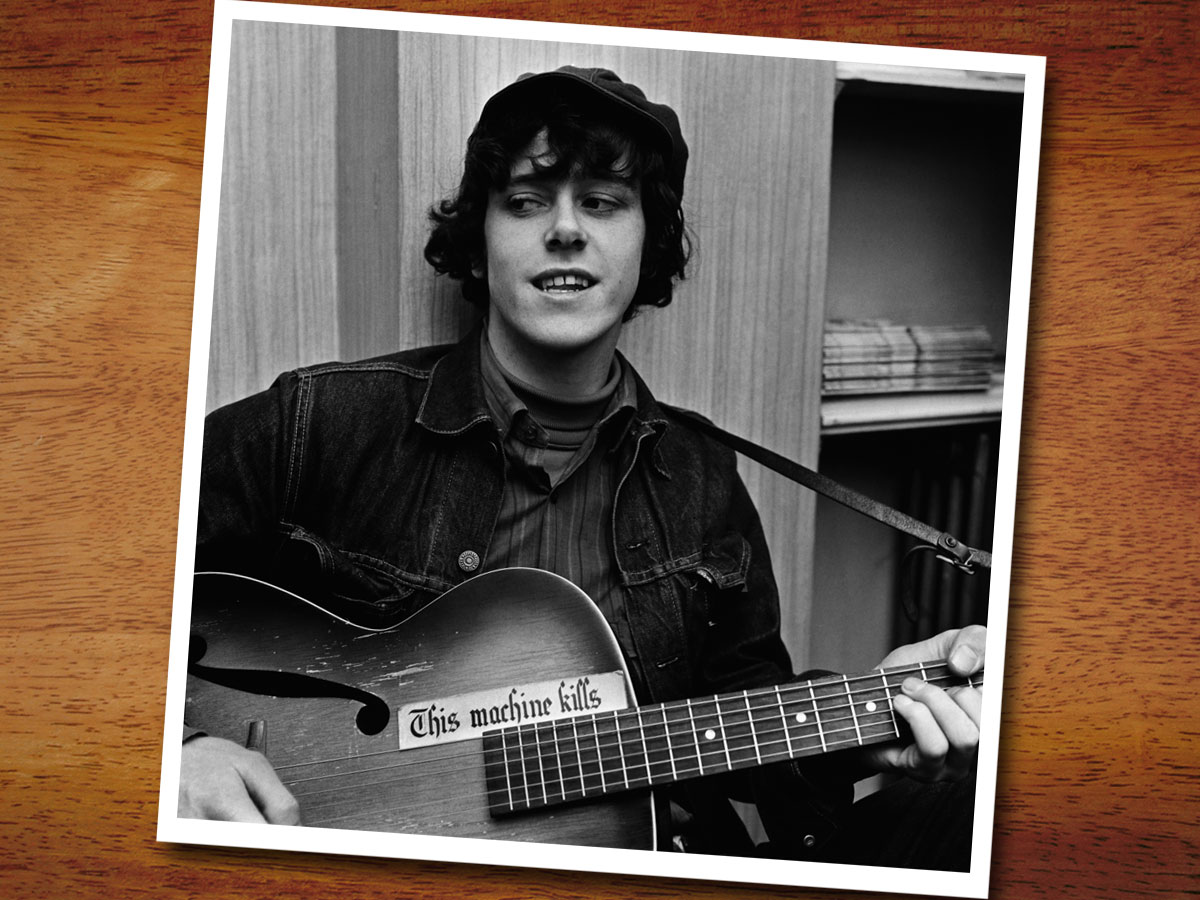
Absorbing Everything
The final song on the first CD of Donovan Retrospective is a brand-new bounding reggae-pop composition, One English Summer, cut in Kingston, Jamaica with producer and old friend Wayne Jobson. Now 50 years on from his debut single Catch The Wind, has Donovan’s general approach to songwriting changed in any significant way?
“Basically, I use the same things I’d learned by the age of 18 or 19,” he explains. “I’d mastered a certain set of musical forms, a set of chords and a set of rhythms and a set of tempos.
"The original forms of traditional ballad are every songwriter’s roots... it will become second nature"
“The original forms of traditional ballad are every songwriter’s roots so when you master the traditional four-line stanza and you play them enough, it will become second nature. I did it, Dylan did it, Joni Mitchell did it, Leonard Cohen did it and The Beatles did it when they were a skiffle band.
“My dad, mum and the family in Glasgow spoon-fed me these Irish and Scots ballads, but then there was Frank Sinatra - my mammy called him ‘My Frankie’ - and I was absorbing his phrasing. Then, my father gave me Billie Holiday, so there was jazz, too. Then there were all the other styles. All these things were going in.
“By the age of 17, I was absorbing and practising bossa nova, Latin, Greek, Gypsy, American country blues, city blues, New Orleans jazz, 1920s and 30s big band, modern jazz, calypso, 50s and 60s pop songs, rock, bluebeat, ska and even fado, that Portuguese kind of blues.
“I absorbed all those forms and I’ve got them all in me. So, has my songwriting changed and developed? Yeah - but I use all the same forms, and when I pick up the guitar, the song kind of tells me what phrase I should use and what chunky style I should use for my guitar playing.”
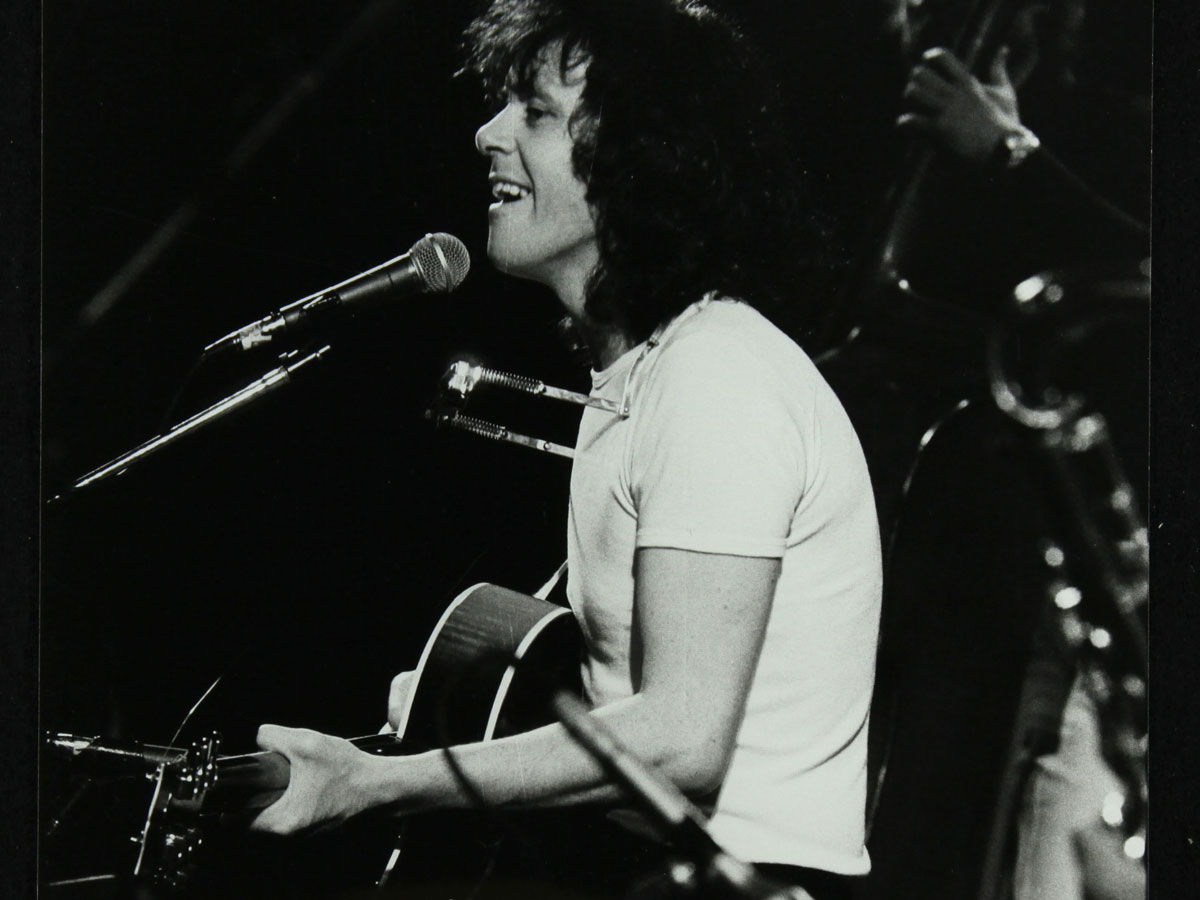
Roots Manoeuvres
At the age of 10, Donovan’s family moved from Glasgow to Hatfield in Hertfordshire and it was here that the budding jazz fan’s musical aspirations began... as a drummer.
"I was able to play all the needs of a band in those six strings. Inside the guitar was my band"
But, by the age of 14, the guitar had taken over and he acquired a Zenith archtop from a mate’s girlfriend. But his initial dalliances with Gene Krupa drum patterns would still come in handy once he hit the beatnik road.
“She never got that Zenith back!”, Donovan enthuses. “It had f-holes, a removable bridge and it was really worn out and really scratchy all over the surface. It was like the early country blues players had and I loved it! I actually recently saw that McCartney’s first was the same one.
“When I hitchhiked away with Gypsy Dave [guitarist, close friend and future tour manager, Gyp Mills] at 16, the guitar was perfect and I realised later that those patterns I’d learned as a drummer made my guitar tempo patterns as steady as a rock. I was able to play all the needs of a band in those six strings. Inside the guitar was my band.
“I was damping, picking, hammering on and off with the left hand, and then playing patterns and styles with the right. A drummer does the same. In the left hand, you’ve got the one stick, in the right hand, you’ve got the other stick and you start with the patterns. That’s what I did with the guitar.”
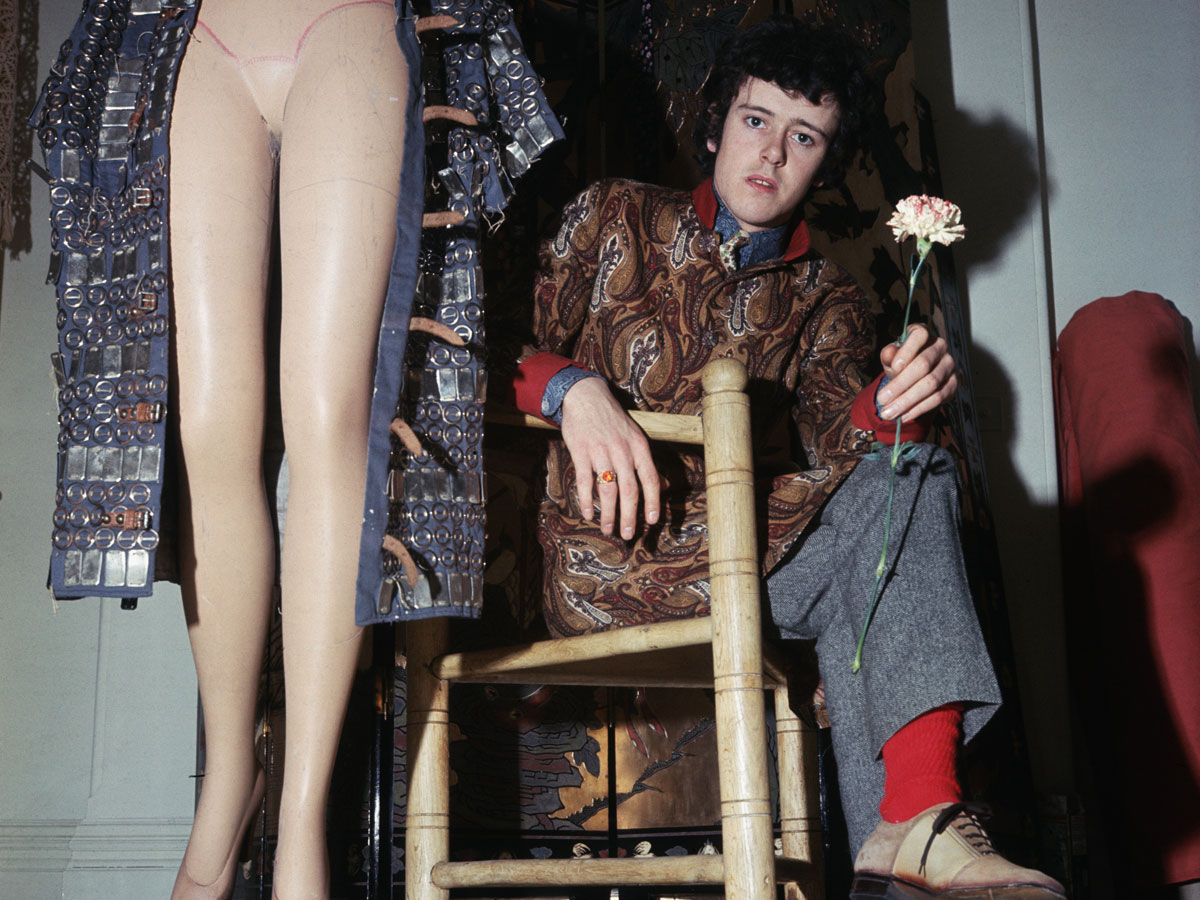
'Hammer And Songs
The vibrant folk scene in St Albans, which was centred around two pubs - The Cock Inn and The Peahen - played a significant role in Donovan’s development as a guitar player. It was at The Peahen that he first encountered legendary figures such as John Renbourn, Bert Jansch, Martin Carthy and even Ramblin’ Jack Elliott.
"A beatnik called Dirty Hugh gave me the clawhammer. He said, ‘Bring a bottle of wine to the graveyard tomorrow morning at 10:30, and I’ll teach you!’"
Local “master of the picking” Mac MacLeod took Donovan under his wing and taught him to play tunes by Big Bill Broonzy and Reverend Gary Davis, but it was an altogether more mystical figure who gifted the teenage picker the clawhammer style of playing.
“It wasn’t Mac that gave me the clawhammer, it was a guy called Dirty Hugh,” laughs Donovan. “He came into St Albans one day and he was a very tall, very dirty, very smelly beatnik with a long coat, a long beard, long hair and a guitar case.
“This one really was the great unwashed... but he opened the guitar case and in it was a Martin dreadnought. I mean, I’d never seen one before! He took the guitar out and played flawless clawhammer.
“I went up to him and I said, ‘Will you teach me?’ and he said, ‘Okay, bring a bottle of wine to the graveyard tomorrow morning at 10:30 and I’ll teach you, but it’ll take a few days!’ The next morning, we sat down, we opened the wine and he told me thumb and third finger on fifth string and second and now it began and he said, ‘After a while, you won’t be able to remember the third move because the brain has got to teach the fingers what they’re doing.’
“He was a good teacher. It took three days and, after a while, I got it. Then before he left town, he said, ‘Now you’ve got it, don’t forget to pass it on!’”
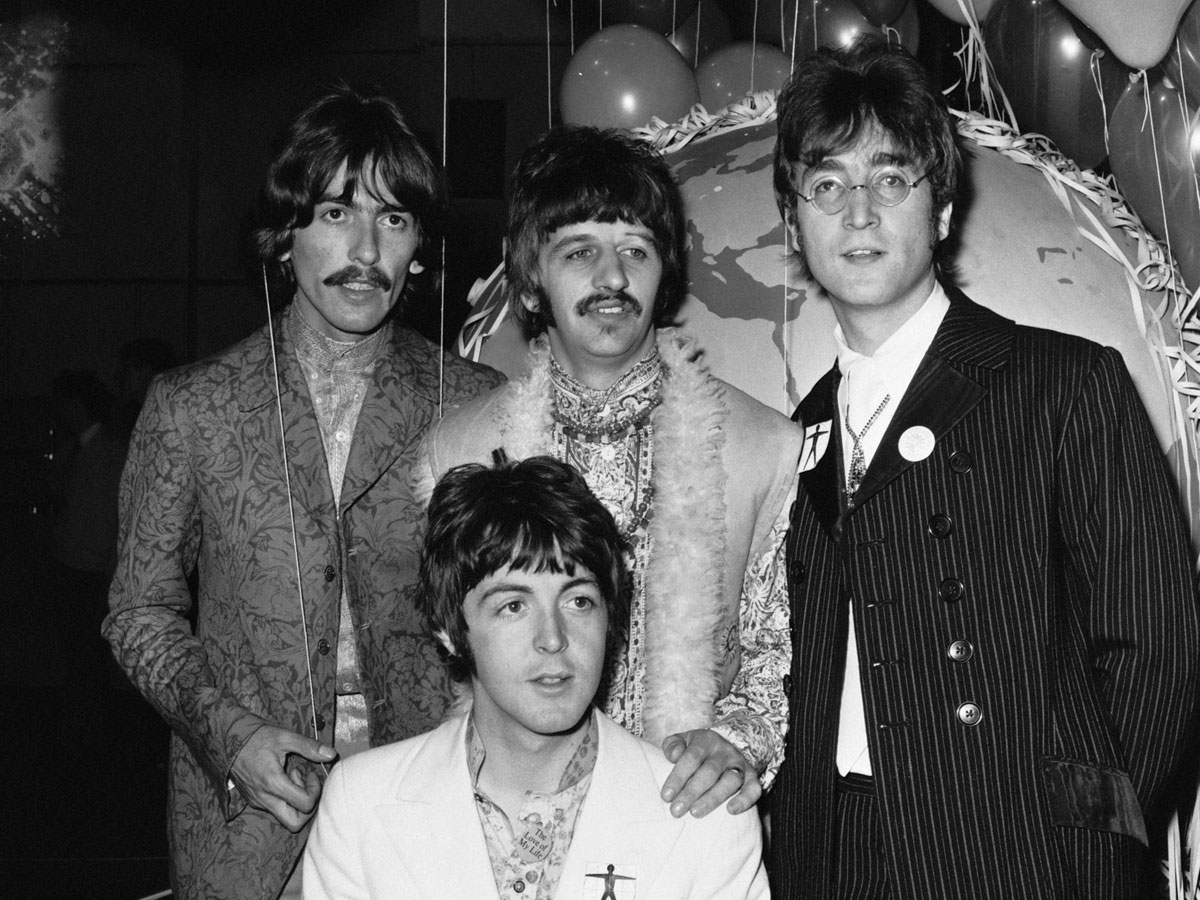
Indian Takeaways
And “pass it on” Donovan certainly did. A few years later, the Glasgow-born songsmith had established himself as a major star on both sides of the Atlantic with a string of musically versatile hits such as Mellow Yellow, his version of Buffy Sainte-Marie’s Universal Soldier, and Sunshine Superman, which even hit the No 1 spot on the US Billboard charts.
"I began teaching the clawhammer to John Lennon. We were sitting face-to-face for two days, looking at each other"
In February 1968, Donovan, Gypsy Dave, The Beatles, Mia Farrow, Mike Love and a few others ventured to India to study transcendental meditation under the Maharishi Mahesh Yogi. Donovan, Lennon, Harrison and McCartney all took acoustic guitars with them and spent hours on end sitting around and jamming the time away.
“I was playing something really fast and I remember John [Lennon] saying, ‘How do you do that?’” says Donovan. “So I slowed it down and began teaching the clawhammer to John. He got it in two days. We were sitting face-to-face for two days, looking at each other.
“It was enlightening for John and he wrote Dear Prudence, Julia and Crippled Inside with that picking pattern. Paul was walking around with his left-handed Martin, but he was listening because it’s also in Blackbird.
“Dirty Hugh was right - ‘Pass this on!’ George was fascinated with the minor descending gypsy patterns that I was playing. He said in the Beatles anthology, ‘Donovan is all over The White Album’ and I did hear all those patterns... the famous song that George would develop out of an A minor descending pattern was While My Guitar Gently Weeps.”
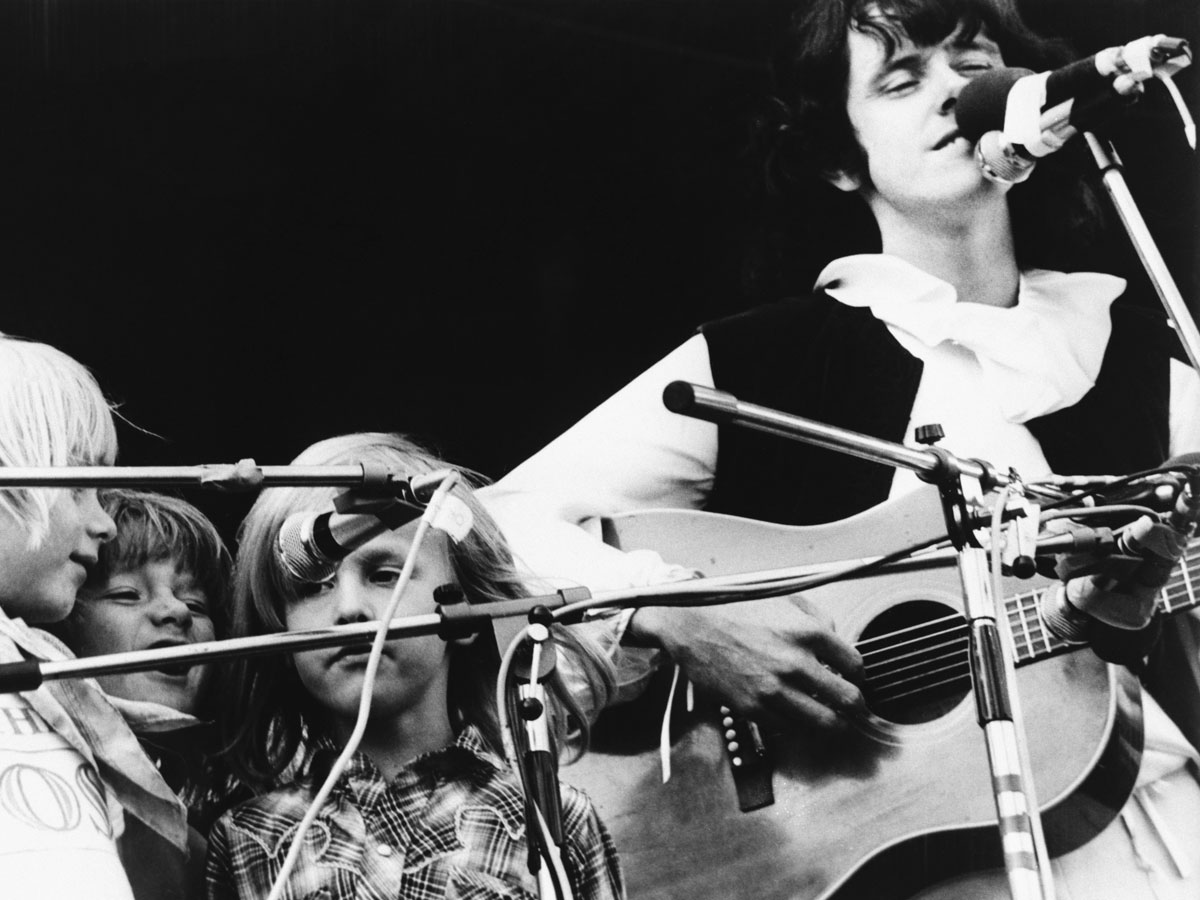
Six-string Winners
There are simply so many supreme guitar moments across Donovan’s 1960s recordings, whether played by the man himself or delivered by some of the most impressive session guys in the business. When it comes to his own rich pickings, Donovan has a few personal favourites.
"One I immediately think of is Get Thy Bearings. There is something about the actual way the acoustic guitar enters that blew me away"
“One that immediately comes to mind is Summer Day Reflection Song with the hammering on and hammering off,” he explains. “My bongo player ‘Candy’ John Carr and me would sit around and play and we’d also sit around with rastas as well in Portobello Road.
“Summer Day Reflection Song was one of those guitar parts that actually sounded like there were bongos playing as well. And there was kind of like a mantra, too, what we would call raga rock. The engineers were using compression and limiters and it made me play in a certain way when I was listening on my headphones [and over-dubbing]. I just started hammering on even more.
“The other one I immediately think of is Get Thy Bearings. It’s sampled continuously by people and there is something about the actual way the acoustic guitar enters that blew me away. Then, when my producer Mickie Most said, ‘Go and play something else’ over that extraordinary playing out by the sax. I started playing an Arabic part or what you now might call Arabic-Celtic.”
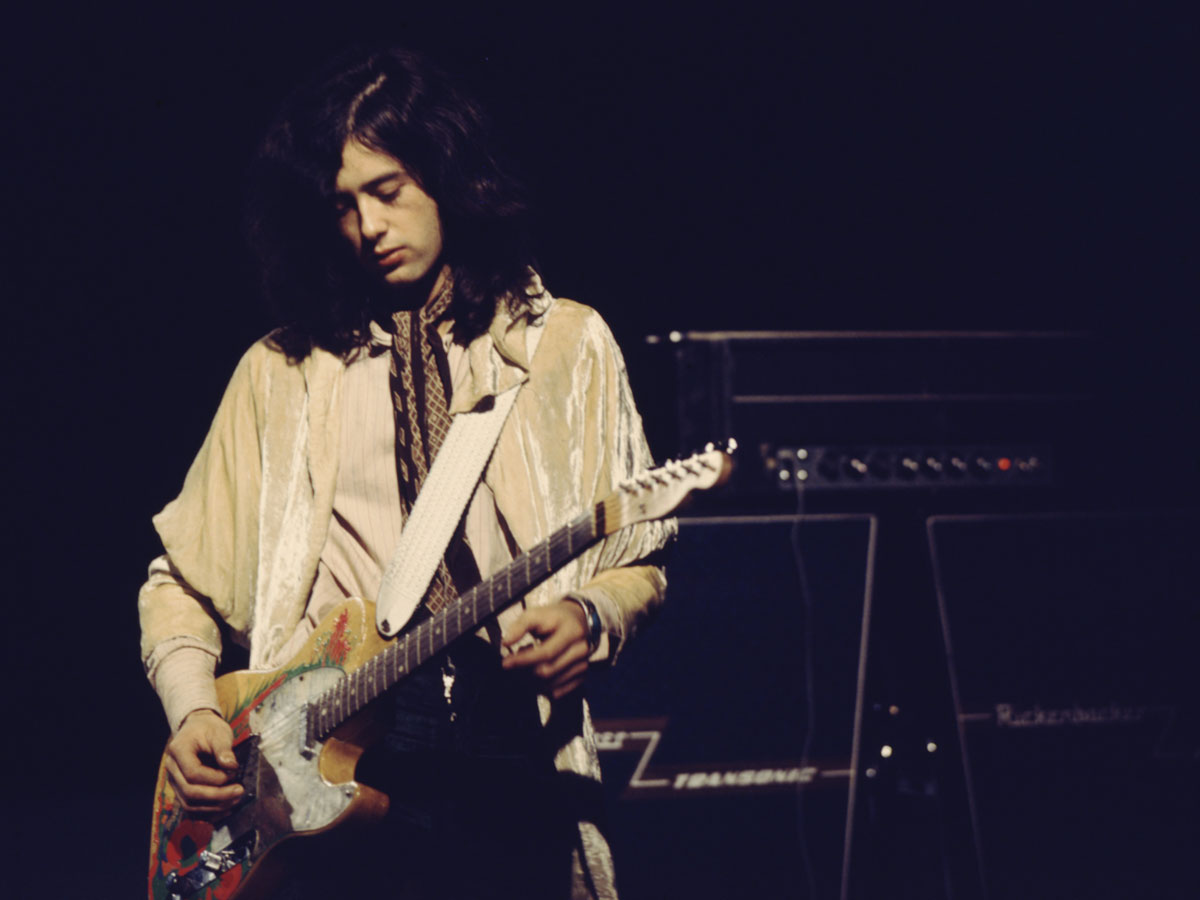
Super sidemen
While Jeff Beck contributed some stunning rhythm and lead work across 1969 long player Barabajagal - check out his deliciously funky riffing on Barabajagal (Love Is Hot) - Jimmy Page also regularly turned up as a session guitarist on Donovan’s early recordings. 1966’s smash hit Sunshine Superman is a case in point.
“[For Sunshine Superman], I wanted a strange new jazz, Latin, baroque, folk, pop and poetry variation with that three-chord blues fusion,” explains Donovan.
"One of my best electric moments would have to be Jimmy Page on Sunshine Superman"
“The jazz sound on Jimmy’s guitar was perfect. You’ll notice it’s not distorted and it’s not what you’d call rock or slide guitar or anything to do with the blues. It was just a very clean jazz guitar sound. One of my best electric moments would have to be Page on Sunshine Superman.”
The majestic Season Of The Witch, also released in 1966, is notable for the fact that it signifies the first time that Donovan ever played electric guitar on record, plugging into an echo-laden white Tele that he’d just picked up for $300 on Sunset Strip.
“I was playing in a very unusual way, doing that drumming thing with damping,” recalls Donovan. “I liked the echo on the amps so I gave it a lot of stick with the echo.”
The Donovan track with arguably the most impressive electric playing is 1968’s Hurdy Gurdy Man, but the exact identity of the guy pumping out the heavy overdriven riffs and licks still remains something of a mystery.
Donovan had originally planned to give the song to his friend Jimi Hendrix, but producer Mickie Most talked him out of it. He then wanted Jimi to play on the session, but he wasn’t available so some other unknown session man stepped in to the void. While it was long mooted that the guy in question was Jimmy Page, this has now been denied.
Donovan himself can’t remember, but still has an inkling that the player might have been Allan Holdsworth. John Paul Jones, who arranged and played bass on the session, has been quoted in the past as saying the mystery man was actually Alan Parker. One thing that can be confirmed is that whoever was responsible deserves a damn good pat on the back.
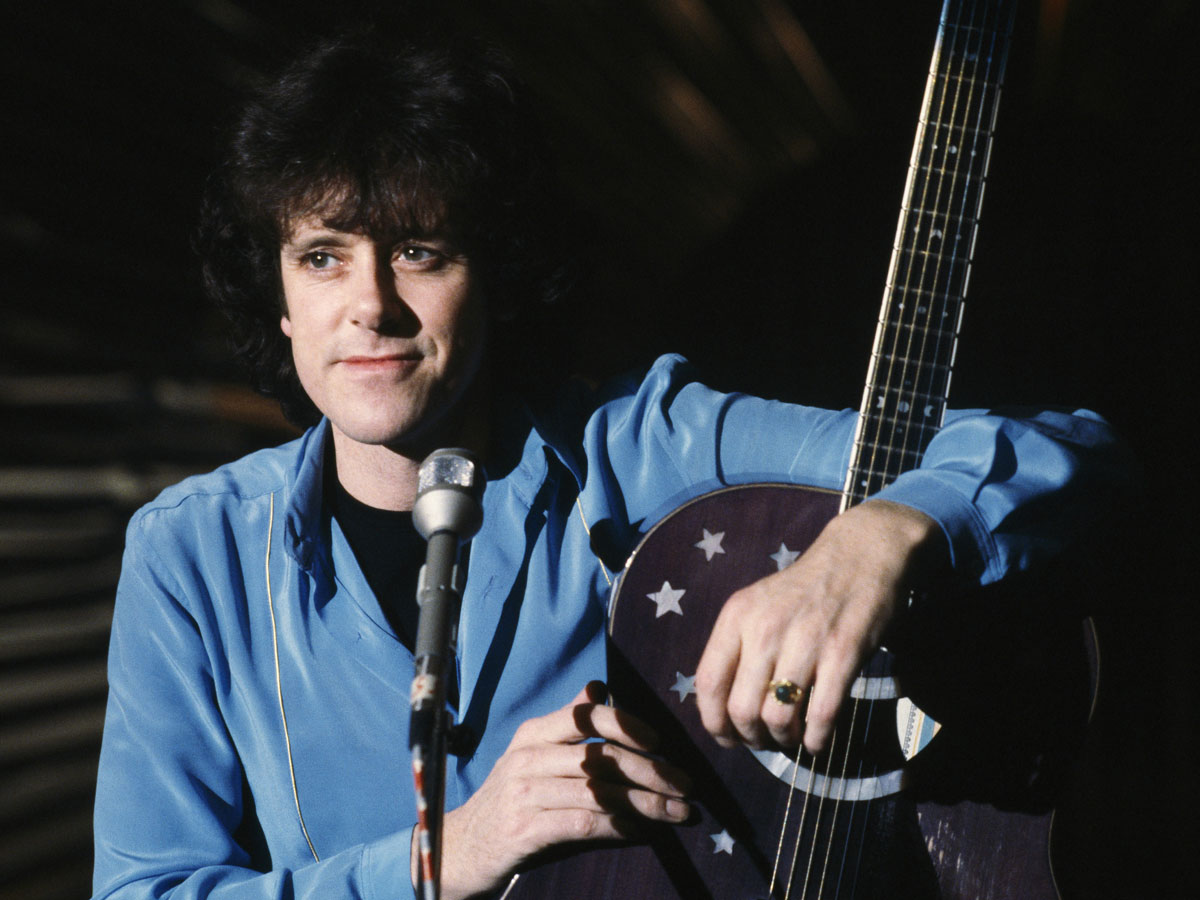
Hurdy Gurdy Twang
“One of my favourites was my little [Gibson] J-45. I bought it on Sunset Boulevard in 1965,” says Donovan of the guitars he cherished most.
"I’ve always thought my J-45 was nicked, but I’ve now got this feeling that it’s going to be found somewhere in one of my stores"
“I used it to write, record and perform every song from late-’65 through to 1970. I’ve always thought it was nicked, but I’ve now got this feeling that it’s going to be found somewhere in one of my stores.
“My first custom guitar was the ‘Blue Moon’, made by Tony Zemaitis in 1970 or 1971. I said to Tony, ‘I’ve got a problem because when I’m playing with Danny Thompson, the low end of the J-45 modulates and reverberates with the strings of Danny’s double bass.’ Tony said he could fix that by reducing the hole and I said, ‘Well, I would like a moon hole!’ and he did that for me.
“Later, I was introduced to Danny Ferrington in California and I played him the ‘Blue Moon’. I said, ‘Keep the sound pretty much the same and I also like the thin neck on the Zemaitis’... and he said, ‘Well, I’ll put a bit of my magic in there, too!’ and he made a guitar called Kelly, because of the Book Of Kells, which is a manuscript in Trinity College, Dublin.
“I wanted to celebrate how Ireland had been so important to me. I gave Danny a photo of the manuscript and he copied the Celtic symbols from it.”
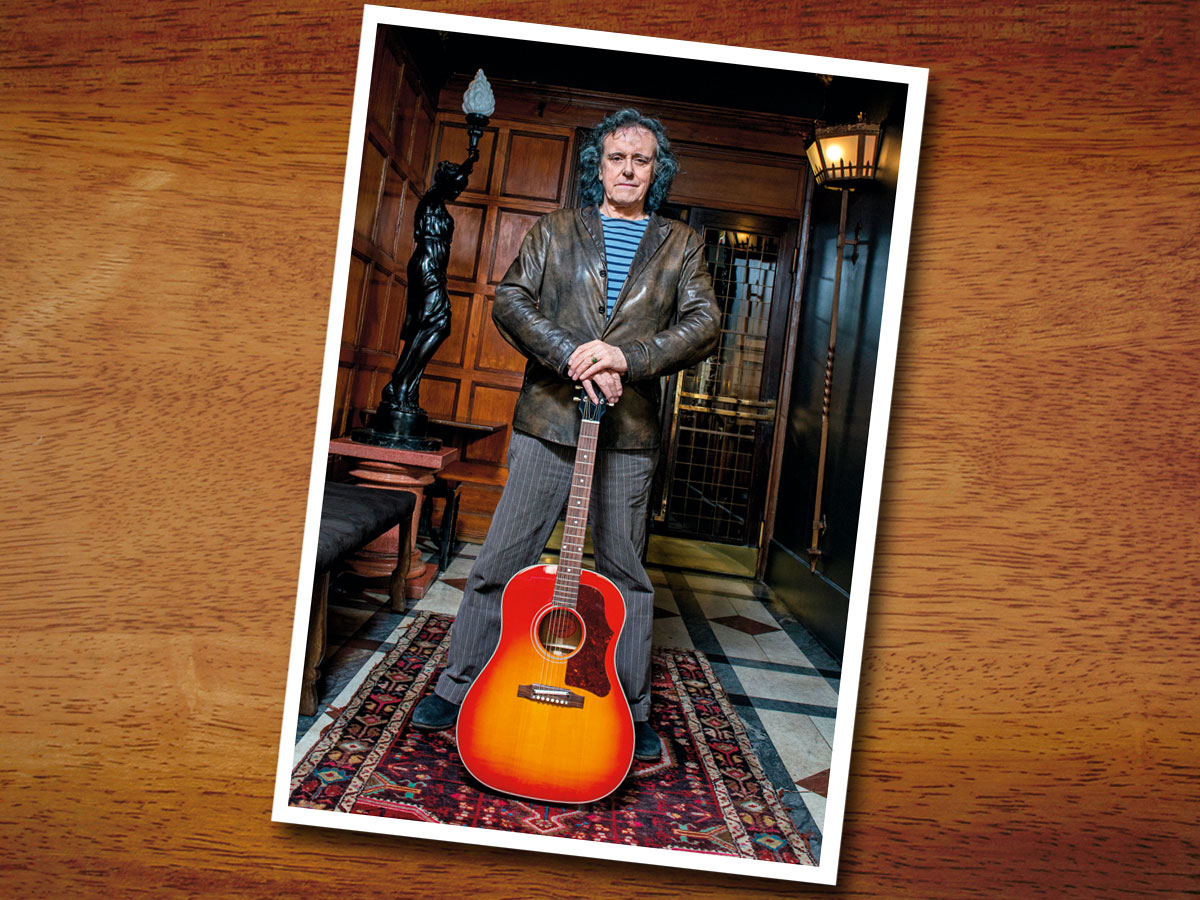
Piece Of The Action
After chewing the fat with Donovan for a very enjoyable couple of hours, we ask him whether there’s anything else he’d like to add. It seems you may want to crack open that old piggy bank in the very near future...
"My website will be showing lots of my guitars and soon people might be able to own one or two"
“I may not have 300 guitars like Jimmy Page but I do have 13!” he laughs. “It’s my 50th anniversary year and I want to scale down to just a couple of guitars. All my guitars are going up [for auction] and a portion of the money is going to teach transcendental meditation to students of the future. My website will be showing lots of my guitars and soon people might be able to own one or two.”
Donovan Retrospective is out now on Union Square Music. For tour news, visit his website www.donovan.ie

